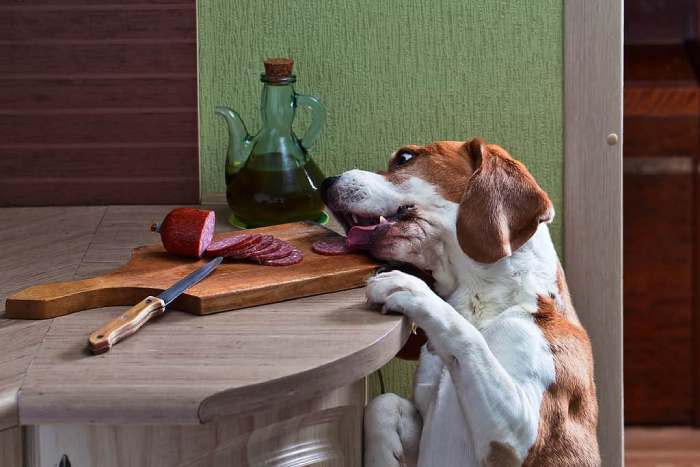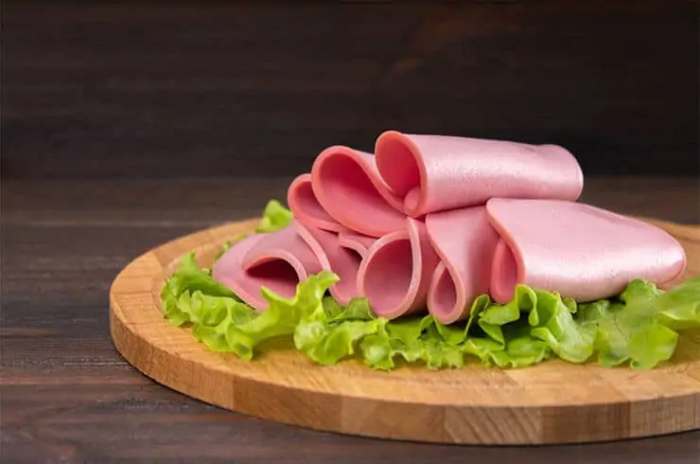Can Dogs Eat Bologna? ‘A dog is a man’s best friend,’ but not all foods are created equal regarding canine nutrition. Bologna has been a popular snack for people for centuries, but is this cured meat a safe or healthy option for your pup?
In this article, we’ll explore the nutritional content, digestion considerations, serving recommendations, health risks, and alternatives of bologna for dogs.
Nutritional Content: Examining the Components of Bologna
Do you want to know if bologna is nutritionally beneficial for your pup?

Bologna is made of beef, pork, or poultry meat and is generally not a good source of nutrition for your pup. It’s usually high in sodium, fat, and calories and low in essential vitamins and minerals. It can also contain allergens, which can trigger sensitivities in some dogs.
It’s best to avoid bologna as part of your pup’s regular diet, as the calorie count is much higher than most other proteins. It may be an occasional treat, but it shouldn’t be a staple in their diet.
Digestion Considerations: Understanding How Dogs Process Bologna
In addition to its lack of nutritional value, bologna can also be difficult for your dog to digest. It’s generally made with low-grade meats and fillers, which can cause gastrointestinal distress. Furthermore, the preservatives and high-fat content found in bologna can cause food allergies, digestive upsets, and gastrointestinal problems.
Not only can bologna cause digestive problems, but it may also contain ingredients that aren’t safe for your pet. This is why it’s important to check the ingredient safety and look for signs of food allergies before feeding bologna to your dog.
Regarding digestion considerations, bologna isn’t a safe or healthy food choice for your pet.
Serving Recommendations: Guidelines for Offering Bologna to Dogs
When it comes to serving bologna to your dog, it’s important to remember that it should never be their main source of nutrition. Instead, it should be used as an occasional treat.

When doing so, paying attention to the slicing techniques and portion sizes is important. To ensure that your pup doesn’t consume too much, it’s best to cut the bologna into small, bite-sized pieces. This makes it easier to control the amount of bologna your dog consumes at any given time.
Additionally, it’s important to be mindful of the portion size. Avoid giving your dog too much bologna, as this could lead to digestive issues. To ensure your pup stays healthy, it’s best to serve bologna in moderation.
Health Risks: Potential Concerns and Risks Associated with Bologna
While serving bologna as a treat may seem harmless, certain health risks are associated with feeding it to your dog. It’s important to be aware of these potential issues and understand how to incorporate bologna into your doggy diet best. Here are three key points to consider:
- Portion size: Bologna is high in fat and sodium, and too much can adversely affect your pup’s health. Feeding your dog no more than a small portion size is recommended.
- Regular vet visits: It’s always a good idea to check in with your vet regularly to ensure your dog has no negative reactions to the bologna.
- Balance: Bologna should be considered a treat, not a regular part of your dog’s diet. Feeding your pup a balanced diet of healthy proteins, fats, and carbohydrates is essential.
Bologna can be a welcome and tasty addition to your pup’s diet when used in moderation. But monitoring portion sizes, visiting the vet regularly, and maintaining a balanced diet is important.
Alternatives: Exploring Safer and Healthier Dog Treat Options
If you’re looking for an alternative to bologna, plenty of healthier options are available. Rawhide treats, organic meats, and specially formulated dog food are all great alternatives for your pup.
| Treat Option | Description | Benefits |
|---|---|---|
| Bologna | Traditional processed meat product | Balanced and complete nutrition supports overall health |
| Rawhide Treats | Chewable treats made from animal hides | It may be high in sodium and additives |
| Organic Meats | High-quality, natural meats without additives | Provides essential nutrients without artificial ingredients |
| Specially Formulated Dog Food | Tailored nutrition for dogs | Balanced and complete nutrition, supports overall health |
When selecting any food for your pup, read the label for ingredients and amounts of fat, salt, and sugar. Also, always consult with your veterinarian to ensure your pup receives the proper nutrition. Finally, please pay close attention to the size and shape of treats to ensure they don’t pose a choking hazard. With these steps, you can feed your pup nutritious and safe alternatives to bologna.
Frequently Asked Questions:
Feeding your dog bologna regularly is not recommended due to food safety and nutritional concerns. Bologna is high in fat and sodium and lacks essential vitamins and minerals for your dog’s health. Feeding your dog bologna occasionally, in small amounts, is acceptable.
Not sure about giving bologna to your pup? Avoid contamination risks and digestibility concerns by steering clear for now. Feeding table scraps isn’t always the best choice. Instead, provide balanced meals that are specifically designed for puppies.
Yes, bologna does contain artificial preservatives. High preservatives can pose health risks, so knowing what to look for on the label is important.
The shelf life of bologna is surprisingly long – stored in an airtight container, and it can easily last months. As an experienced expert, I can assure you that bologna is a great choice for long-term storage. Invest in quality storage containers, and you will reap the rewards of a deliciously preserved treat.
Yes, feeding your dog bologna can lead to obesity if you overfeed them. Bologna is high in fat content, so if you give your dog too much, they are at risk of gaining weight.
Conclusion:
When feeding your pup, bologna should be a once-in-a-while treat. While it may provide some protein, the potential risks outweigh the benefits. Too much sodium, nitrates, and fat can have serious health consequences for your furry friend.
So, it’s best to keep bologna off the menu and opt for healthier, canine-friendly snacks. Your pup will thank you – and you’ll sleep easy knowing you’ve made the right decision.

Hey there, I’m Janet Brooks, a dog-loving student from California. I’m all about helping pups in need, especially those without homes. Me and my awesome friends work together to give shelter and love to stray dogs. Oh, and I also write blogs about dogs to share helpful info.